Role of Line Managers & Leaders in Employee Development: A Case Study
VerifiedAdded on 2023/06/15
|11
|2941
|173
Project
AI Summary
This project proposal delves into the critical role of line managers and leaders in employee development, using Morrisons, a major UK supermarket chain, as a case study. It aims to analyze the impact of leadership on employee growth, understand the significance of talent management within the organization, and identify effective strategies for attracting and retaining talent. The research employs a positivism philosophy and a deductive approach, utilizing quantitative surveys and primary/secondary data collection methods. The project explores precedents and sources related to the role of line managers, the importance of talent management, and strategies for talent retention, all within the context of Morrisons. Ethical considerations, including informed consent, are addressed to ensure responsible research practices. The study concludes that effective leadership and talent management strategies are crucial for employee development and organizational success, highlighting the importance of training, recruitment, and employee motivation.
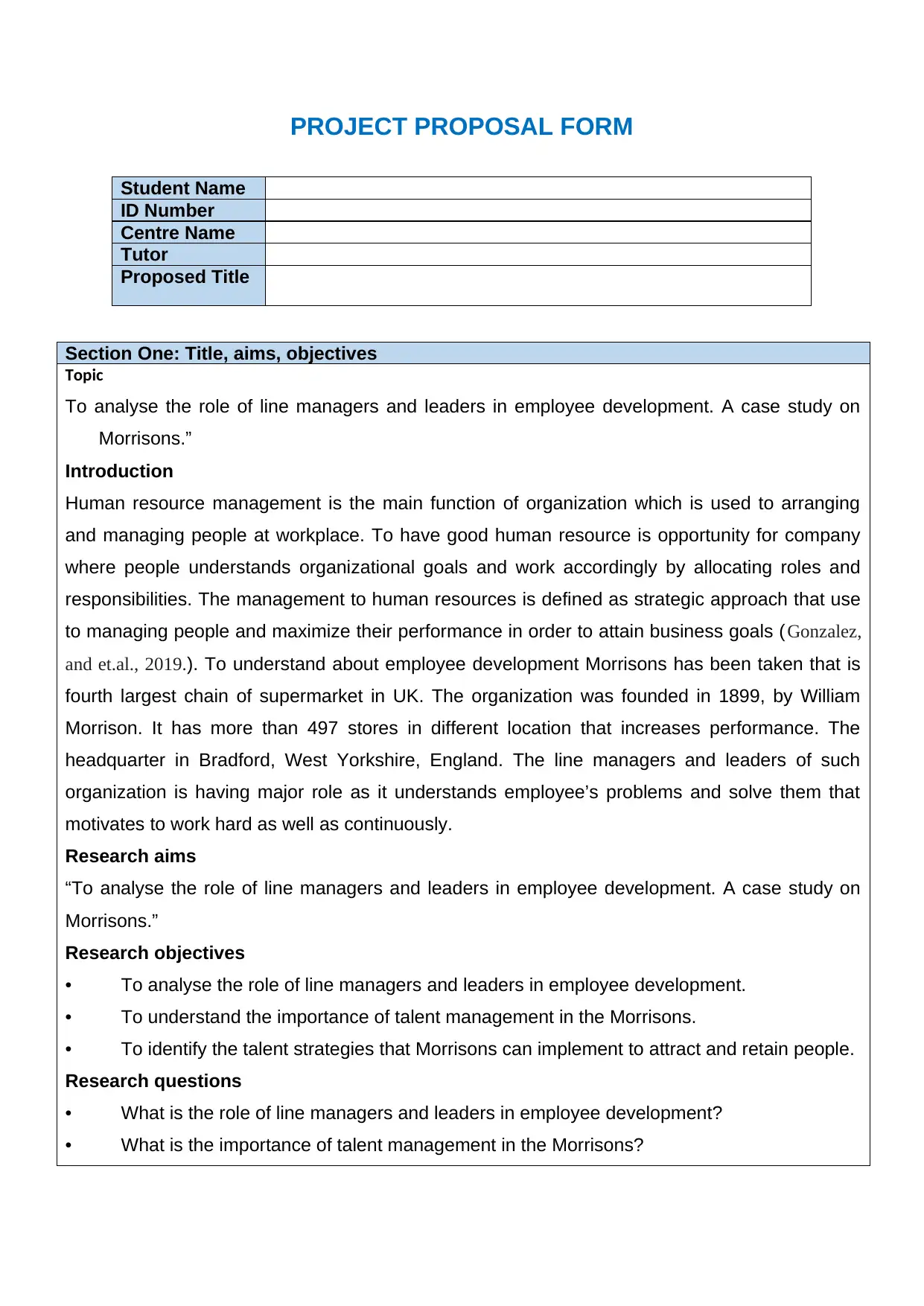
PROJECT PROPOSAL FORM
Student Name
ID Number
Centre Name
Tutor
Proposed Title
Section One: Title, aims, objectives
Topic
To analyse the role of line managers and leaders in employee development. A case study on
Morrisons.”
Introduction
Human resource management is the main function of organization which is used to arranging
and managing people at workplace. To have good human resource is opportunity for company
where people understands organizational goals and work accordingly by allocating roles and
responsibilities. The management to human resources is defined as strategic approach that use
to managing people and maximize their performance in order to attain business goals ( Gonzalez,
and et.al., 2019.). To understand about employee development Morrisons has been taken that is
fourth largest chain of supermarket in UK. The organization was founded in 1899, by William
Morrison. It has more than 497 stores in different location that increases performance. The
headquarter in Bradford, West Yorkshire, England. The line managers and leaders of such
organization is having major role as it understands employee’s problems and solve them that
motivates to work hard as well as continuously.
Research aims
“To analyse the role of line managers and leaders in employee development. A case study on
Morrisons.”
Research objectives
• To analyse the role of line managers and leaders in employee development.
• To understand the importance of talent management in the Morrisons.
• To identify the talent strategies that Morrisons can implement to attract and retain people.
Research questions
• What is the role of line managers and leaders in employee development?
• What is the importance of talent management in the Morrisons?
Student Name
ID Number
Centre Name
Tutor
Proposed Title
Section One: Title, aims, objectives
Topic
To analyse the role of line managers and leaders in employee development. A case study on
Morrisons.”
Introduction
Human resource management is the main function of organization which is used to arranging
and managing people at workplace. To have good human resource is opportunity for company
where people understands organizational goals and work accordingly by allocating roles and
responsibilities. The management to human resources is defined as strategic approach that use
to managing people and maximize their performance in order to attain business goals ( Gonzalez,
and et.al., 2019.). To understand about employee development Morrisons has been taken that is
fourth largest chain of supermarket in UK. The organization was founded in 1899, by William
Morrison. It has more than 497 stores in different location that increases performance. The
headquarter in Bradford, West Yorkshire, England. The line managers and leaders of such
organization is having major role as it understands employee’s problems and solve them that
motivates to work hard as well as continuously.
Research aims
“To analyse the role of line managers and leaders in employee development. A case study on
Morrisons.”
Research objectives
• To analyse the role of line managers and leaders in employee development.
• To understand the importance of talent management in the Morrisons.
• To identify the talent strategies that Morrisons can implement to attract and retain people.
Research questions
• What is the role of line managers and leaders in employee development?
• What is the importance of talent management in the Morrisons?
Paraphrase This Document
Need a fresh take? Get an instant paraphrase of this document with our AI Paraphraser
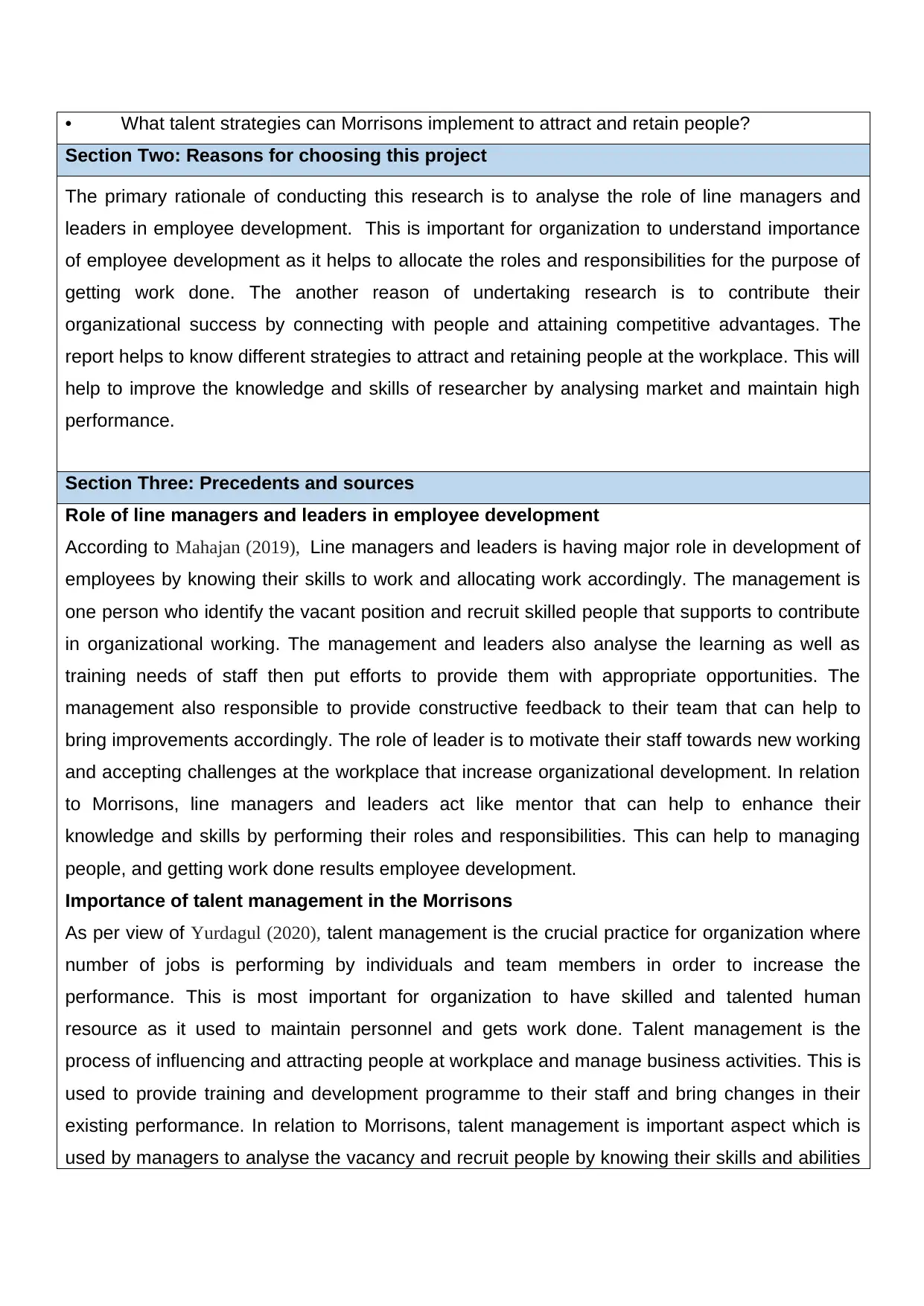
• What talent strategies can Morrisons implement to attract and retain people?
Section Two: Reasons for choosing this project
The primary rationale of conducting this research is to analyse the role of line managers and
leaders in employee development. This is important for organization to understand importance
of employee development as it helps to allocate the roles and responsibilities for the purpose of
getting work done. The another reason of undertaking research is to contribute their
organizational success by connecting with people and attaining competitive advantages. The
report helps to know different strategies to attract and retaining people at the workplace. This will
help to improve the knowledge and skills of researcher by analysing market and maintain high
performance.
Section Three: Precedents and sources
Role of line managers and leaders in employee development
According to Mahajan (2019), Line managers and leaders is having major role in development of
employees by knowing their skills to work and allocating work accordingly. The management is
one person who identify the vacant position and recruit skilled people that supports to contribute
in organizational working. The management and leaders also analyse the learning as well as
training needs of staff then put efforts to provide them with appropriate opportunities. The
management also responsible to provide constructive feedback to their team that can help to
bring improvements accordingly. The role of leader is to motivate their staff towards new working
and accepting challenges at the workplace that increase organizational development. In relation
to Morrisons, line managers and leaders act like mentor that can help to enhance their
knowledge and skills by performing their roles and responsibilities. This can help to managing
people, and getting work done results employee development.
Importance of talent management in the Morrisons
As per view of Yurdagul (2020), talent management is the crucial practice for organization where
number of jobs is performing by individuals and team members in order to increase the
performance. This is most important for organization to have skilled and talented human
resource as it used to maintain personnel and gets work done. Talent management is the
process of influencing and attracting people at workplace and manage business activities. This is
used to provide training and development programme to their staff and bring changes in their
existing performance. In relation to Morrisons, talent management is important aspect which is
used by managers to analyse the vacancy and recruit people by knowing their skills and abilities
Section Two: Reasons for choosing this project
The primary rationale of conducting this research is to analyse the role of line managers and
leaders in employee development. This is important for organization to understand importance
of employee development as it helps to allocate the roles and responsibilities for the purpose of
getting work done. The another reason of undertaking research is to contribute their
organizational success by connecting with people and attaining competitive advantages. The
report helps to know different strategies to attract and retaining people at the workplace. This will
help to improve the knowledge and skills of researcher by analysing market and maintain high
performance.
Section Three: Precedents and sources
Role of line managers and leaders in employee development
According to Mahajan (2019), Line managers and leaders is having major role in development of
employees by knowing their skills to work and allocating work accordingly. The management is
one person who identify the vacant position and recruit skilled people that supports to contribute
in organizational working. The management and leaders also analyse the learning as well as
training needs of staff then put efforts to provide them with appropriate opportunities. The
management also responsible to provide constructive feedback to their team that can help to
bring improvements accordingly. The role of leader is to motivate their staff towards new working
and accepting challenges at the workplace that increase organizational development. In relation
to Morrisons, line managers and leaders act like mentor that can help to enhance their
knowledge and skills by performing their roles and responsibilities. This can help to managing
people, and getting work done results employee development.
Importance of talent management in the Morrisons
As per view of Yurdagul (2020), talent management is the crucial practice for organization where
number of jobs is performing by individuals and team members in order to increase the
performance. This is most important for organization to have skilled and talented human
resource as it used to maintain personnel and gets work done. Talent management is the
process of influencing and attracting people at workplace and manage business activities. This is
used to provide training and development programme to their staff and bring changes in their
existing performance. In relation to Morrisons, talent management is important aspect which is
used by managers to analyse the vacancy and recruit people by knowing their skills and abilities
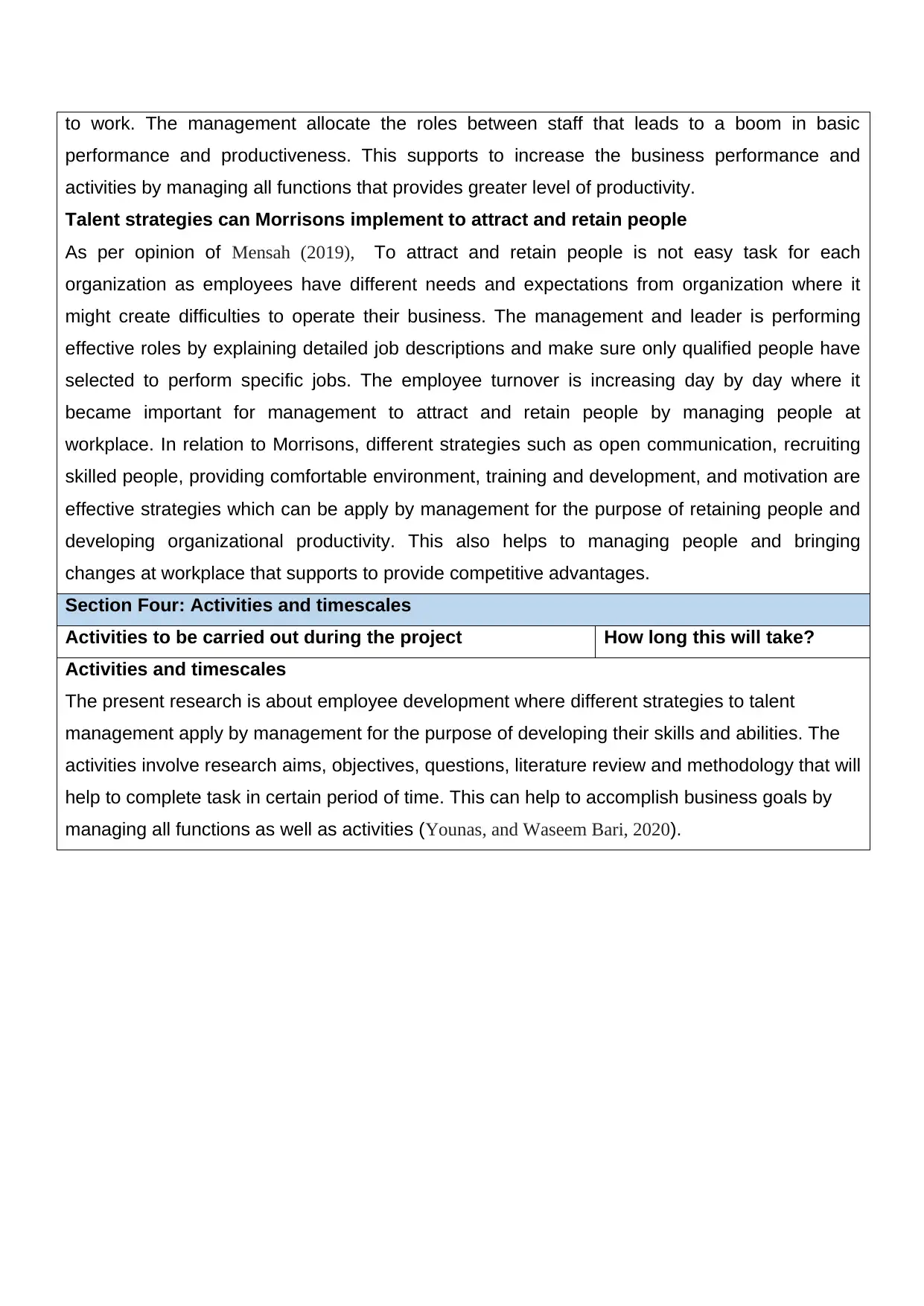
to work. The management allocate the roles between staff that leads to a boom in basic
performance and productiveness. This supports to increase the business performance and
activities by managing all functions that provides greater level of productivity.
Talent strategies can Morrisons implement to attract and retain people
As per opinion of Mensah (2019), To attract and retain people is not easy task for each
organization as employees have different needs and expectations from organization where it
might create difficulties to operate their business. The management and leader is performing
effective roles by explaining detailed job descriptions and make sure only qualified people have
selected to perform specific jobs. The employee turnover is increasing day by day where it
became important for management to attract and retain people by managing people at
workplace. In relation to Morrisons, different strategies such as open communication, recruiting
skilled people, providing comfortable environment, training and development, and motivation are
effective strategies which can be apply by management for the purpose of retaining people and
developing organizational productivity. This also helps to managing people and bringing
changes at workplace that supports to provide competitive advantages.
Section Four: Activities and timescales
Activities to be carried out during the project How long this will take?
Activities and timescales
The present research is about employee development where different strategies to talent
management apply by management for the purpose of developing their skills and abilities. The
activities involve research aims, objectives, questions, literature review and methodology that will
help to complete task in certain period of time. This can help to accomplish business goals by
managing all functions as well as activities (Younas, and Waseem Bari, 2020).
performance and productiveness. This supports to increase the business performance and
activities by managing all functions that provides greater level of productivity.
Talent strategies can Morrisons implement to attract and retain people
As per opinion of Mensah (2019), To attract and retain people is not easy task for each
organization as employees have different needs and expectations from organization where it
might create difficulties to operate their business. The management and leader is performing
effective roles by explaining detailed job descriptions and make sure only qualified people have
selected to perform specific jobs. The employee turnover is increasing day by day where it
became important for management to attract and retain people by managing people at
workplace. In relation to Morrisons, different strategies such as open communication, recruiting
skilled people, providing comfortable environment, training and development, and motivation are
effective strategies which can be apply by management for the purpose of retaining people and
developing organizational productivity. This also helps to managing people and bringing
changes at workplace that supports to provide competitive advantages.
Section Four: Activities and timescales
Activities to be carried out during the project How long this will take?
Activities and timescales
The present research is about employee development where different strategies to talent
management apply by management for the purpose of developing their skills and abilities. The
activities involve research aims, objectives, questions, literature review and methodology that will
help to complete task in certain period of time. This can help to accomplish business goals by
managing all functions as well as activities (Younas, and Waseem Bari, 2020).
⊘ This is a preview!⊘
Do you want full access?
Subscribe today to unlock all pages.

Trusted by 1+ million students worldwide
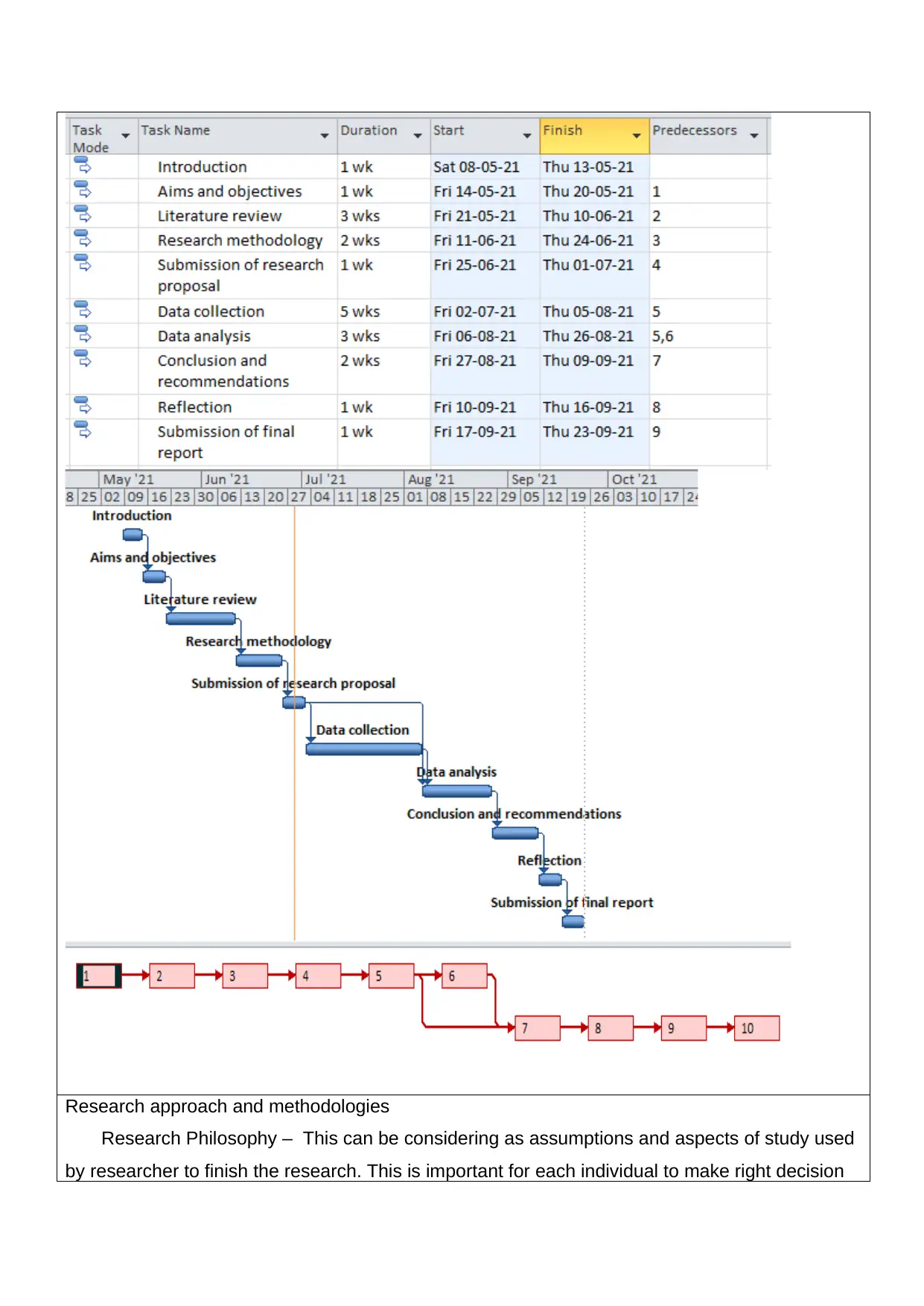
Research approach and methodologies
Research Philosophy – This can be considering as assumptions and aspects of study used
by researcher to finish the research. This is important for each individual to make right decision
Research Philosophy – This can be considering as assumptions and aspects of study used
by researcher to finish the research. This is important for each individual to make right decision
Paraphrase This Document
Need a fresh take? Get an instant paraphrase of this document with our AI Paraphraser
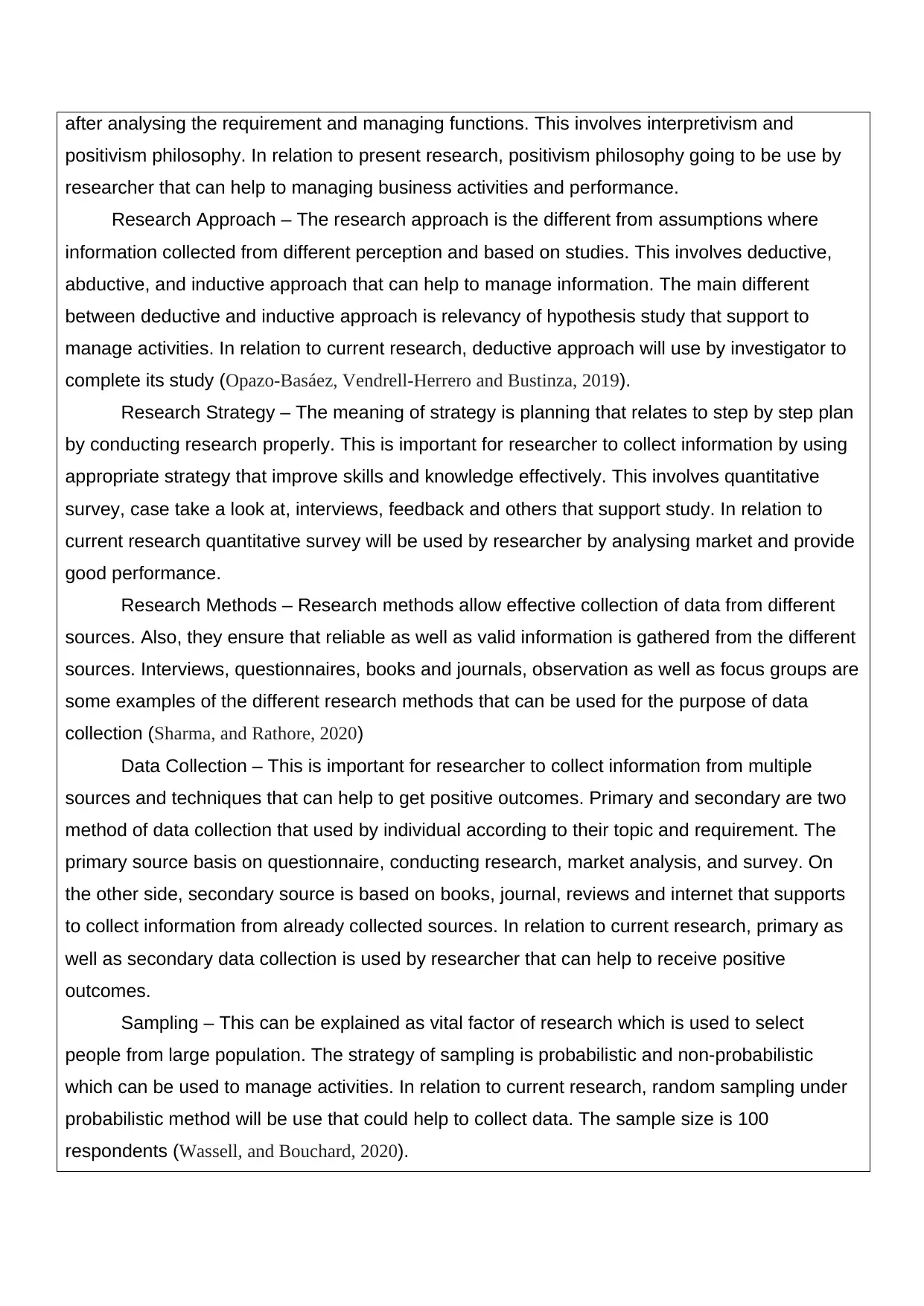
after analysing the requirement and managing functions. This involves interpretivism and
positivism philosophy. In relation to present research, positivism philosophy going to be use by
researcher that can help to managing business activities and performance.
Research Approach – The research approach is the different from assumptions where
information collected from different perception and based on studies. This involves deductive,
abductive, and inductive approach that can help to manage information. The main different
between deductive and inductive approach is relevancy of hypothesis study that support to
manage activities. In relation to current research, deductive approach will use by investigator to
complete its study (Opazo-Basáez, Vendrell-Herrero and Bustinza, 2019).
Research Strategy – The meaning of strategy is planning that relates to step by step plan
by conducting research properly. This is important for researcher to collect information by using
appropriate strategy that improve skills and knowledge effectively. This involves quantitative
survey, case take a look at, interviews, feedback and others that support study. In relation to
current research quantitative survey will be used by researcher by analysing market and provide
good performance.
Research Methods – Research methods allow effective collection of data from different
sources. Also, they ensure that reliable as well as valid information is gathered from the different
sources. Interviews, questionnaires, books and journals, observation as well as focus groups are
some examples of the different research methods that can be used for the purpose of data
collection (Sharma, and Rathore, 2020)
Data Collection – This is important for researcher to collect information from multiple
sources and techniques that can help to get positive outcomes. Primary and secondary are two
method of data collection that used by individual according to their topic and requirement. The
primary source basis on questionnaire, conducting research, market analysis, and survey. On
the other side, secondary source is based on books, journal, reviews and internet that supports
to collect information from already collected sources. In relation to current research, primary as
well as secondary data collection is used by researcher that can help to receive positive
outcomes.
Sampling – This can be explained as vital factor of research which is used to select
people from large population. The strategy of sampling is probabilistic and non-probabilistic
which can be used to manage activities. In relation to current research, random sampling under
probabilistic method will be use that could help to collect data. The sample size is 100
respondents (Wassell, and Bouchard, 2020).
positivism philosophy. In relation to present research, positivism philosophy going to be use by
researcher that can help to managing business activities and performance.
Research Approach – The research approach is the different from assumptions where
information collected from different perception and based on studies. This involves deductive,
abductive, and inductive approach that can help to manage information. The main different
between deductive and inductive approach is relevancy of hypothesis study that support to
manage activities. In relation to current research, deductive approach will use by investigator to
complete its study (Opazo-Basáez, Vendrell-Herrero and Bustinza, 2019).
Research Strategy – The meaning of strategy is planning that relates to step by step plan
by conducting research properly. This is important for researcher to collect information by using
appropriate strategy that improve skills and knowledge effectively. This involves quantitative
survey, case take a look at, interviews, feedback and others that support study. In relation to
current research quantitative survey will be used by researcher by analysing market and provide
good performance.
Research Methods – Research methods allow effective collection of data from different
sources. Also, they ensure that reliable as well as valid information is gathered from the different
sources. Interviews, questionnaires, books and journals, observation as well as focus groups are
some examples of the different research methods that can be used for the purpose of data
collection (Sharma, and Rathore, 2020)
Data Collection – This is important for researcher to collect information from multiple
sources and techniques that can help to get positive outcomes. Primary and secondary are two
method of data collection that used by individual according to their topic and requirement. The
primary source basis on questionnaire, conducting research, market analysis, and survey. On
the other side, secondary source is based on books, journal, reviews and internet that supports
to collect information from already collected sources. In relation to current research, primary as
well as secondary data collection is used by researcher that can help to receive positive
outcomes.
Sampling – This can be explained as vital factor of research which is used to select
people from large population. The strategy of sampling is probabilistic and non-probabilistic
which can be used to manage activities. In relation to current research, random sampling under
probabilistic method will be use that could help to collect data. The sample size is 100
respondents (Wassell, and Bouchard, 2020).
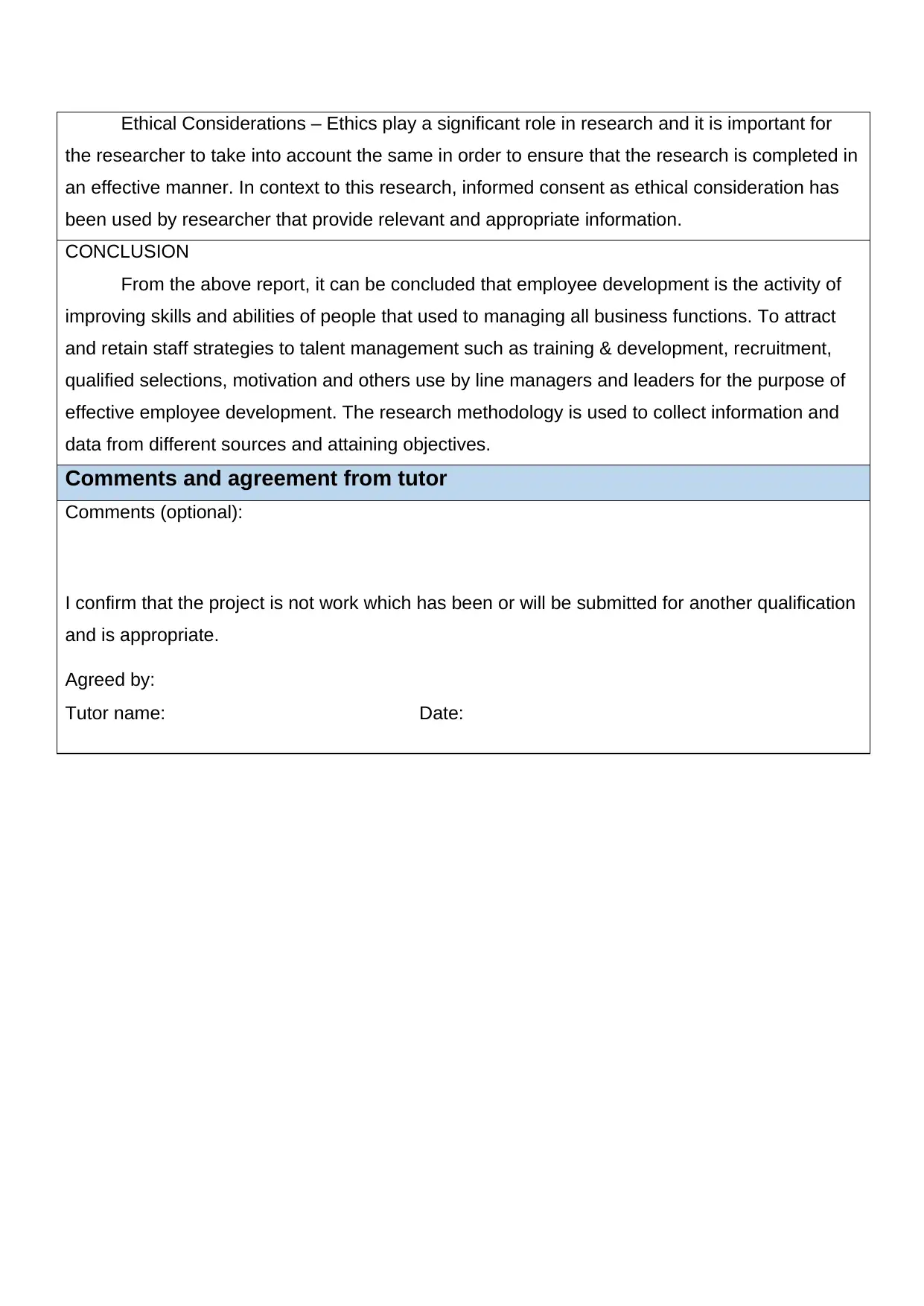
Ethical Considerations – Ethics play a significant role in research and it is important for
the researcher to take into account the same in order to ensure that the research is completed in
an effective manner. In context to this research, informed consent as ethical consideration has
been used by researcher that provide relevant and appropriate information.
CONCLUSION
From the above report, it can be concluded that employee development is the activity of
improving skills and abilities of people that used to managing all business functions. To attract
and retain staff strategies to talent management such as training & development, recruitment,
qualified selections, motivation and others use by line managers and leaders for the purpose of
effective employee development. The research methodology is used to collect information and
data from different sources and attaining objectives.
Comments and agreement from tutor
Comments (optional):
I confirm that the project is not work which has been or will be submitted for another qualification
and is appropriate.
Agreed by:
Tutor name: Date:
the researcher to take into account the same in order to ensure that the research is completed in
an effective manner. In context to this research, informed consent as ethical consideration has
been used by researcher that provide relevant and appropriate information.
CONCLUSION
From the above report, it can be concluded that employee development is the activity of
improving skills and abilities of people that used to managing all business functions. To attract
and retain staff strategies to talent management such as training & development, recruitment,
qualified selections, motivation and others use by line managers and leaders for the purpose of
effective employee development. The research methodology is used to collect information and
data from different sources and attaining objectives.
Comments and agreement from tutor
Comments (optional):
I confirm that the project is not work which has been or will be submitted for another qualification
and is appropriate.
Agreed by:
Tutor name: Date:
⊘ This is a preview!⊘
Do you want full access?
Subscribe today to unlock all pages.

Trusted by 1+ million students worldwide
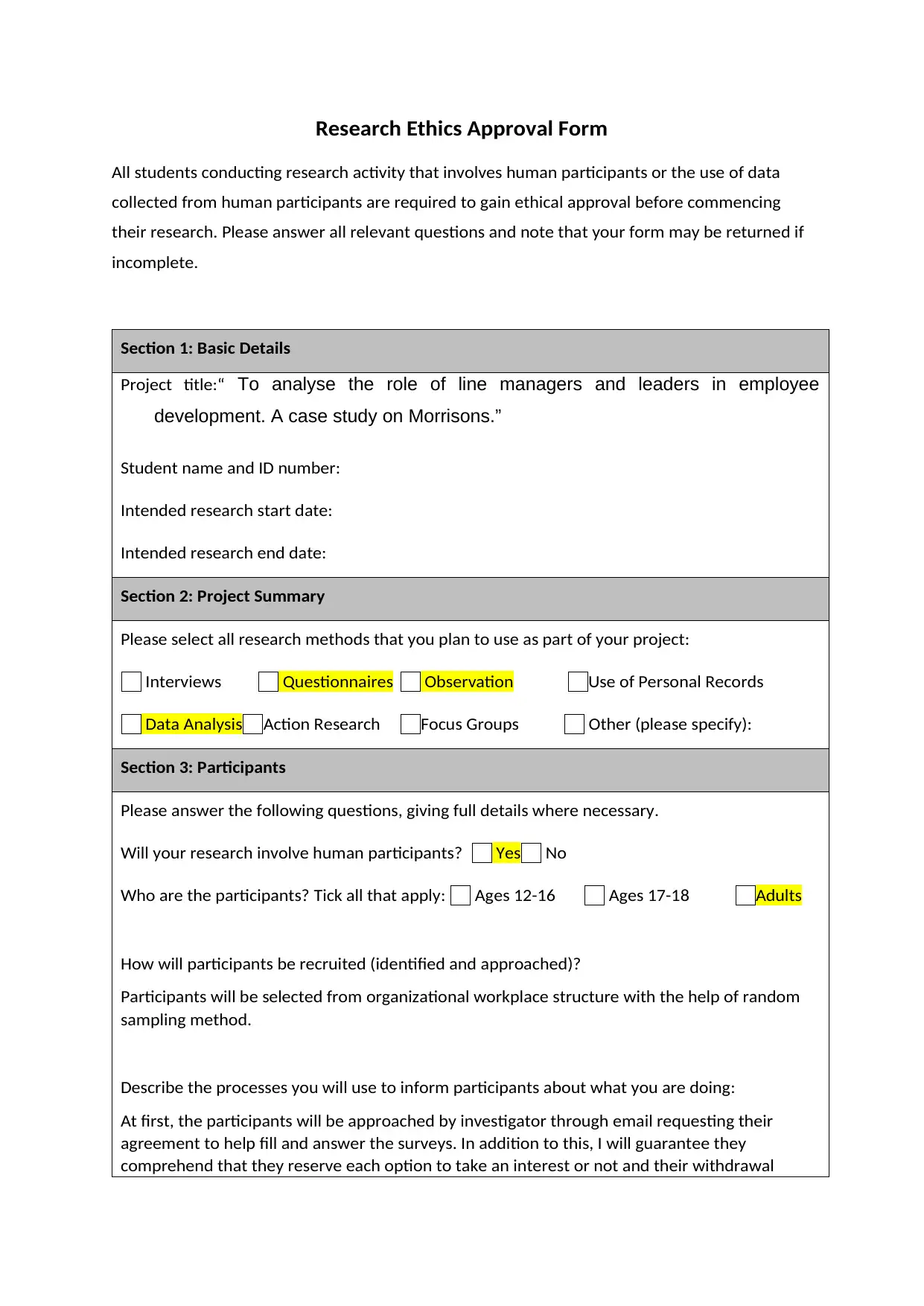
Research Ethics Approval Form
All students conducting research activity that involves human participants or the use of data
collected from human participants are required to gain ethical approval before commencing
their research. Please answer all relevant questions and note that your form may be returned if
incomplete.
Section 1: Basic Details
Project title:“ To analyse the role of line managers and leaders in employee
development. A case study on Morrisons.”
Student name and ID number:
Intended research start date:
Intended research end date:
Section 2: Project Summary
Please select all research methods that you plan to use as part of your project:
Interviews Questionnaires Observation Use of Personal Records
Data Analysis Action Research Focus Groups Other (please specify):
Section 3: Participants
Please answer the following questions, giving full details where necessary.
Will your research involve human participants? Yes No
Who are the participants? Tick all that apply: Ages 12-16 Ages 17-18 Adults
How will participants be recruited (identified and approached)?
Participants will be selected from organizational workplace structure with the help of random
sampling method.
Describe the processes you will use to inform participants about what you are doing:
At first, the participants will be approached by investigator through email requesting their
agreement to help fill and answer the surveys. In addition to this, I will guarantee they
comprehend that they reserve each option to take an interest or not and their withdrawal
All students conducting research activity that involves human participants or the use of data
collected from human participants are required to gain ethical approval before commencing
their research. Please answer all relevant questions and note that your form may be returned if
incomplete.
Section 1: Basic Details
Project title:“ To analyse the role of line managers and leaders in employee
development. A case study on Morrisons.”
Student name and ID number:
Intended research start date:
Intended research end date:
Section 2: Project Summary
Please select all research methods that you plan to use as part of your project:
Interviews Questionnaires Observation Use of Personal Records
Data Analysis Action Research Focus Groups Other (please specify):
Section 3: Participants
Please answer the following questions, giving full details where necessary.
Will your research involve human participants? Yes No
Who are the participants? Tick all that apply: Ages 12-16 Ages 17-18 Adults
How will participants be recruited (identified and approached)?
Participants will be selected from organizational workplace structure with the help of random
sampling method.
Describe the processes you will use to inform participants about what you are doing:
At first, the participants will be approached by investigator through email requesting their
agreement to help fill and answer the surveys. In addition to this, I will guarantee they
comprehend that they reserve each option to take an interest or not and their withdrawal
Paraphrase This Document
Need a fresh take? Get an instant paraphrase of this document with our AI Paraphraser
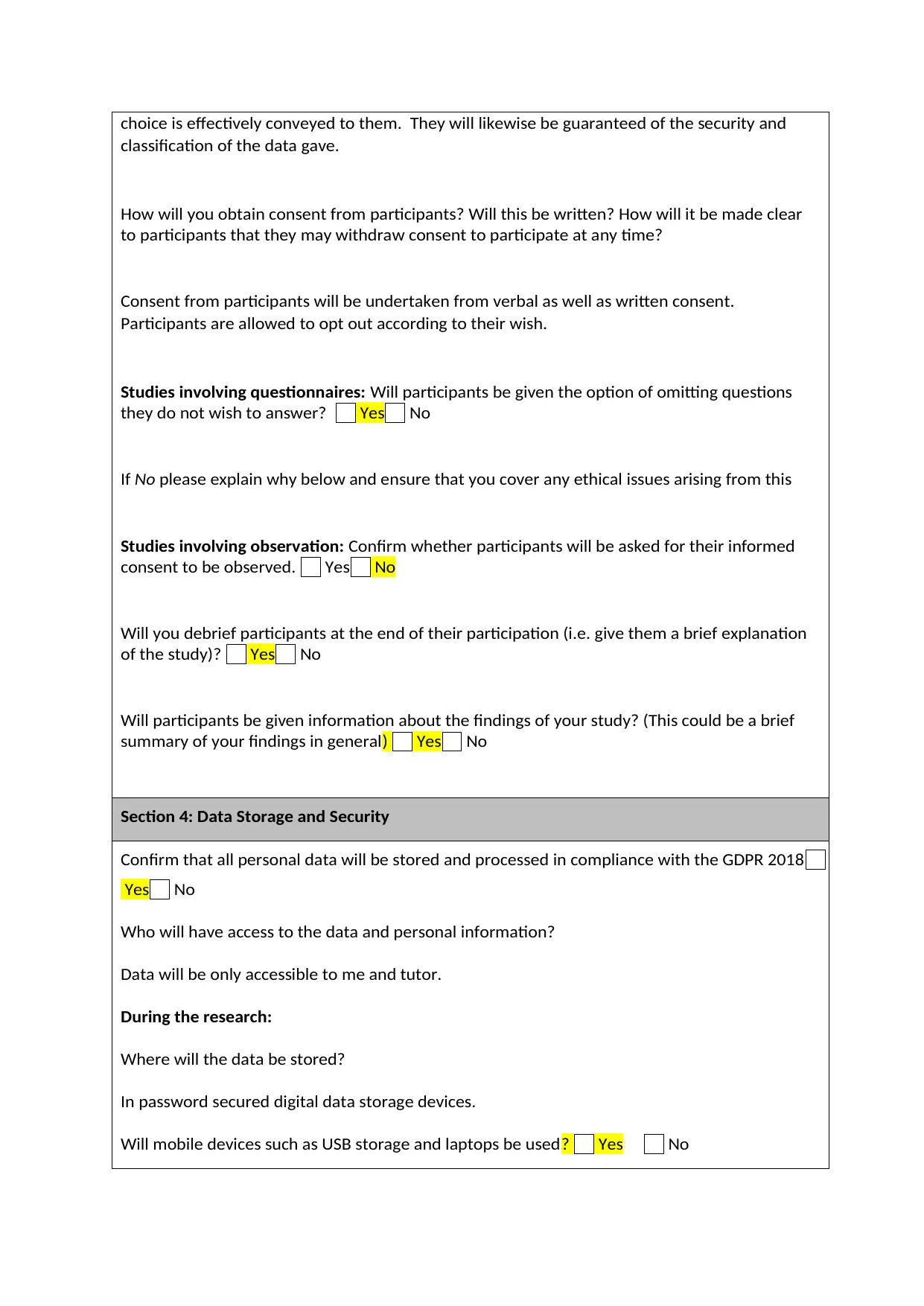
choice is effectively conveyed to them. They will likewise be guaranteed of the security and
classification of the data gave.
How will you obtain consent from participants? Will this be written? How will it be made clear
to participants that they may withdraw consent to participate at any time?
Consent from participants will be undertaken from verbal as well as written consent.
Participants are allowed to opt out according to their wish.
Studies involving questionnaires: Will participants be given the option of omitting questions
they do not wish to answer? Yes No
If No please explain why below and ensure that you cover any ethical issues arising from this
Studies involving observation: Confirm whether participants will be asked for their informed
consent to be observed. Yes No
Will you debrief participants at the end of their participation (i.e. give them a brief explanation
of the study)? Yes No
Will participants be given information about the findings of your study? (This could be a brief
summary of your findings in general) Yes No
Section 4: Data Storage and Security
Confirm that all personal data will be stored and processed in compliance with the GDPR 2018
Yes No
Who will have access to the data and personal information?
Data will be only accessible to me and tutor.
During the research:
Where will the data be stored?
In password secured digital data storage devices.
Will mobile devices such as USB storage and laptops be used? Yes No
classification of the data gave.
How will you obtain consent from participants? Will this be written? How will it be made clear
to participants that they may withdraw consent to participate at any time?
Consent from participants will be undertaken from verbal as well as written consent.
Participants are allowed to opt out according to their wish.
Studies involving questionnaires: Will participants be given the option of omitting questions
they do not wish to answer? Yes No
If No please explain why below and ensure that you cover any ethical issues arising from this
Studies involving observation: Confirm whether participants will be asked for their informed
consent to be observed. Yes No
Will you debrief participants at the end of their participation (i.e. give them a brief explanation
of the study)? Yes No
Will participants be given information about the findings of your study? (This could be a brief
summary of your findings in general) Yes No
Section 4: Data Storage and Security
Confirm that all personal data will be stored and processed in compliance with the GDPR 2018
Yes No
Who will have access to the data and personal information?
Data will be only accessible to me and tutor.
During the research:
Where will the data be stored?
In password secured digital data storage devices.
Will mobile devices such as USB storage and laptops be used? Yes No
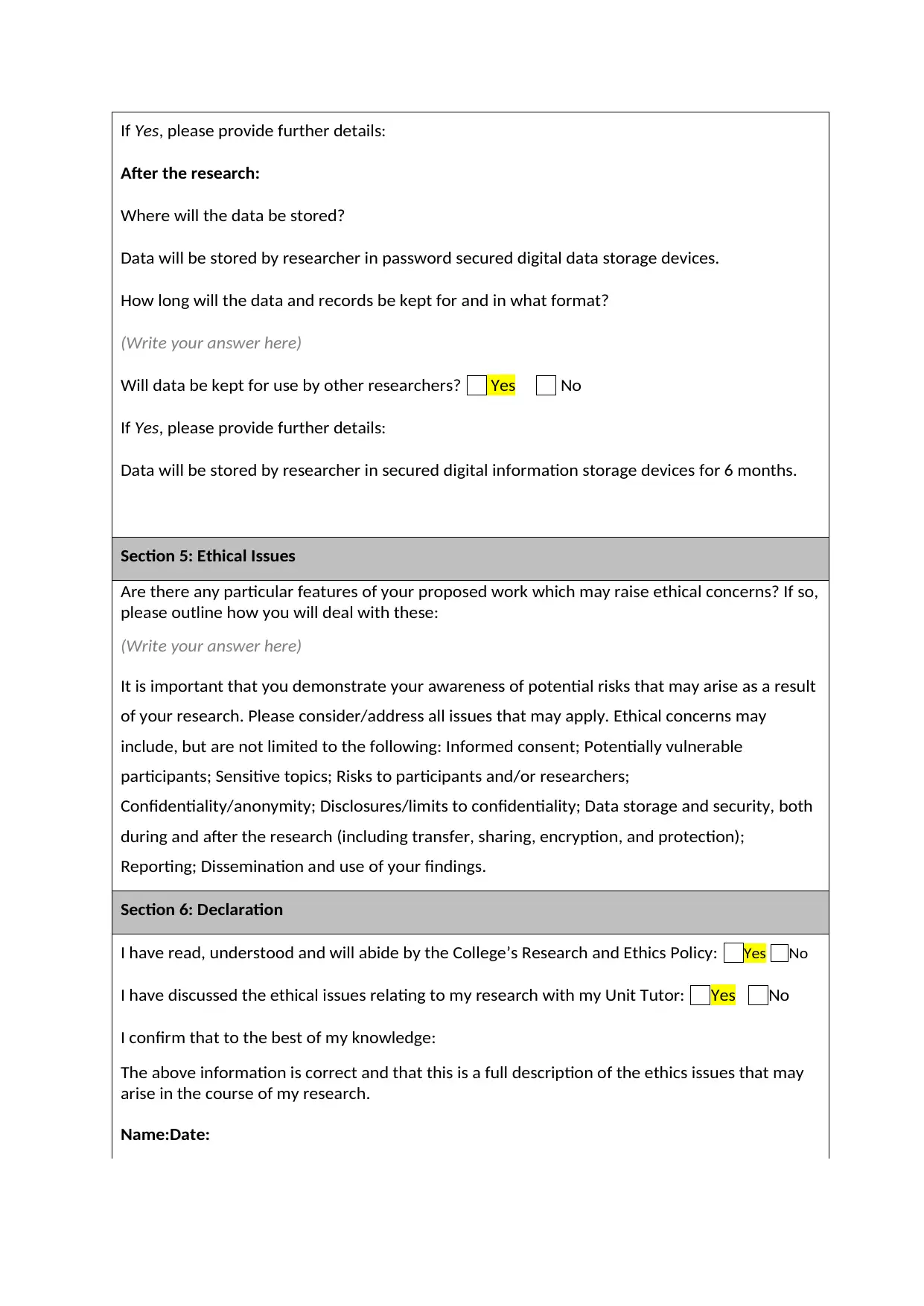
If Yes, please provide further details:
After the research:
Where will the data be stored?
Data will be stored by researcher in password secured digital data storage devices.
How long will the data and records be kept for and in what format?
(Write your answer here)
Will data be kept for use by other researchers? Yes No
If Yes, please provide further details:
Data will be stored by researcher in secured digital information storage devices for 6 months.
Section 5: Ethical Issues
Are there any particular features of your proposed work which may raise ethical concerns? If so,
please outline how you will deal with these:
(Write your answer here)
It is important that you demonstrate your awareness of potential risks that may arise as a result
of your research. Please consider/address all issues that may apply. Ethical concerns may
include, but are not limited to the following: Informed consent; Potentially vulnerable
participants; Sensitive topics; Risks to participants and/or researchers;
Confidentiality/anonymity; Disclosures/limits to confidentiality; Data storage and security, both
during and after the research (including transfer, sharing, encryption, and protection);
Reporting; Dissemination and use of your findings.
Section 6: Declaration
I have read, understood and will abide by the College’s Research and Ethics Policy: Yes No
I have discussed the ethical issues relating to my research with my Unit Tutor: Yes No
I confirm that to the best of my knowledge:
The above information is correct and that this is a full description of the ethics issues that may
arise in the course of my research.
Name:Date:
After the research:
Where will the data be stored?
Data will be stored by researcher in password secured digital data storage devices.
How long will the data and records be kept for and in what format?
(Write your answer here)
Will data be kept for use by other researchers? Yes No
If Yes, please provide further details:
Data will be stored by researcher in secured digital information storage devices for 6 months.
Section 5: Ethical Issues
Are there any particular features of your proposed work which may raise ethical concerns? If so,
please outline how you will deal with these:
(Write your answer here)
It is important that you demonstrate your awareness of potential risks that may arise as a result
of your research. Please consider/address all issues that may apply. Ethical concerns may
include, but are not limited to the following: Informed consent; Potentially vulnerable
participants; Sensitive topics; Risks to participants and/or researchers;
Confidentiality/anonymity; Disclosures/limits to confidentiality; Data storage and security, both
during and after the research (including transfer, sharing, encryption, and protection);
Reporting; Dissemination and use of your findings.
Section 6: Declaration
I have read, understood and will abide by the College’s Research and Ethics Policy: Yes No
I have discussed the ethical issues relating to my research with my Unit Tutor: Yes No
I confirm that to the best of my knowledge:
The above information is correct and that this is a full description of the ethics issues that may
arise in the course of my research.
Name:Date:
⊘ This is a preview!⊘
Do you want full access?
Subscribe today to unlock all pages.

Trusted by 1+ million students worldwide

Please submit your completed form in the designated section on Moodle ()
Paraphrase This Document
Need a fresh take? Get an instant paraphrase of this document with our AI Paraphraser
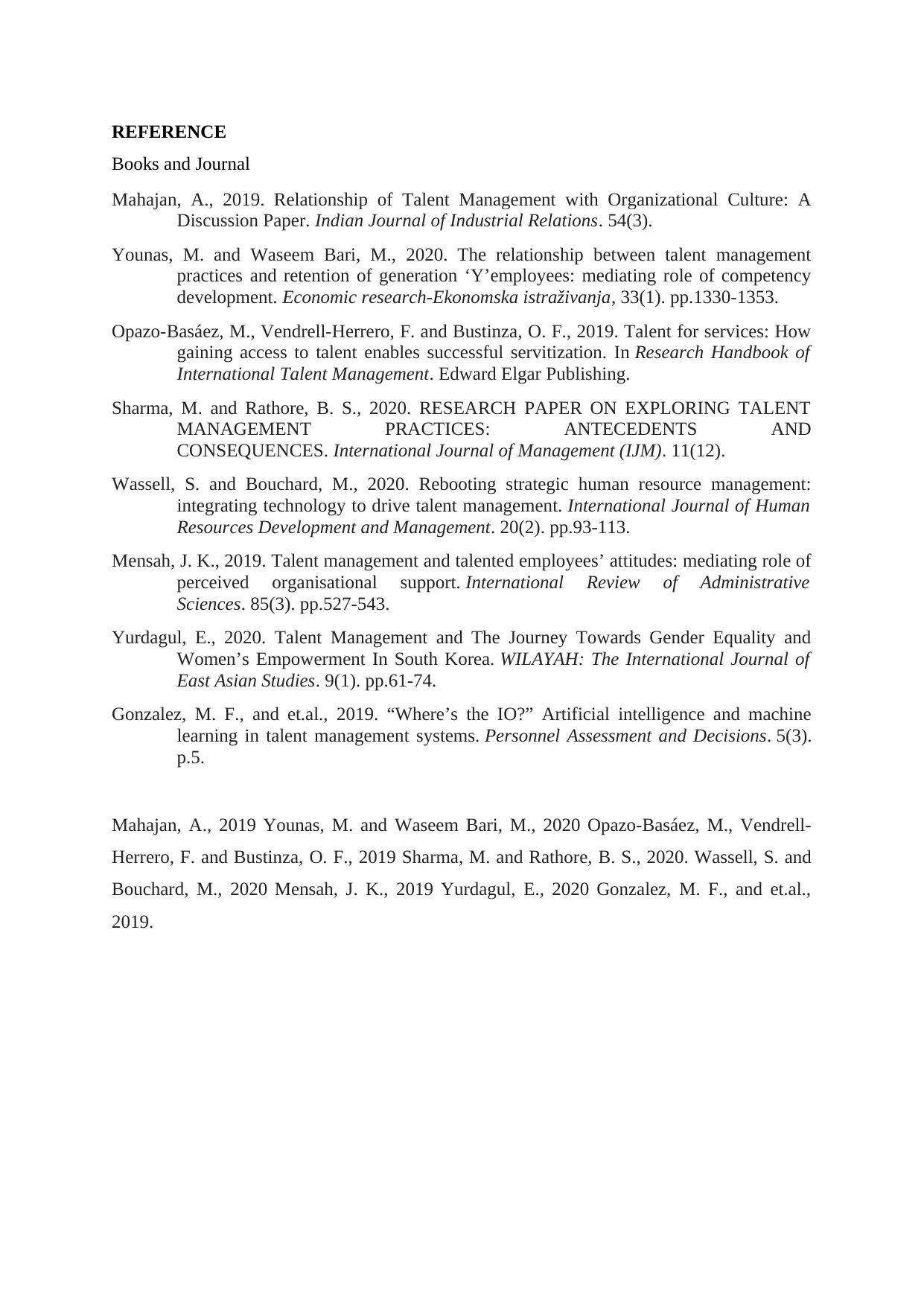
REFERENCE
Books and Journal
Mahajan, A., 2019. Relationship of Talent Management with Organizational Culture: A
Discussion Paper. Indian Journal of Industrial Relations. 54(3).
Younas, M. and Waseem Bari, M., 2020. The relationship between talent management
practices and retention of generation ‘Y’employees: mediating role of competency
development. Economic research-Ekonomska istraživanja, 33(1). pp.1330-1353.
Opazo-Basáez, M., Vendrell-Herrero, F. and Bustinza, O. F., 2019. Talent for services: How
gaining access to talent enables successful servitization. In Research Handbook of
International Talent Management. Edward Elgar Publishing.
Sharma, M. and Rathore, B. S., 2020. RESEARCH PAPER ON EXPLORING TALENT
MANAGEMENT PRACTICES: ANTECEDENTS AND
CONSEQUENCES. International Journal of Management (IJM). 11(12).
Wassell, S. and Bouchard, M., 2020. Rebooting strategic human resource management:
integrating technology to drive talent management. International Journal of Human
Resources Development and Management. 20(2). pp.93-113.
Mensah, J. K., 2019. Talent management and talented employees’ attitudes: mediating role of
perceived organisational support. International Review of Administrative
Sciences. 85(3). pp.527-543.
Yurdagul, E., 2020. Talent Management and The Journey Towards Gender Equality and
Women’s Empowerment In South Korea. WILAYAH: The International Journal of
East Asian Studies. 9(1). pp.61-74.
Gonzalez, M. F., and et.al., 2019. “Where’s the IO?” Artificial intelligence and machine
learning in talent management systems. Personnel Assessment and Decisions. 5(3).
p.5.
Mahajan, A., 2019 Younas, M. and Waseem Bari, M., 2020 Opazo-Basáez, M., Vendrell-
Herrero, F. and Bustinza, O. F., 2019 Sharma, M. and Rathore, B. S., 2020. Wassell, S. and
Bouchard, M., 2020 Mensah, J. K., 2019 Yurdagul, E., 2020 Gonzalez, M. F., and et.al.,
2019.
Books and Journal
Mahajan, A., 2019. Relationship of Talent Management with Organizational Culture: A
Discussion Paper. Indian Journal of Industrial Relations. 54(3).
Younas, M. and Waseem Bari, M., 2020. The relationship between talent management
practices and retention of generation ‘Y’employees: mediating role of competency
development. Economic research-Ekonomska istraživanja, 33(1). pp.1330-1353.
Opazo-Basáez, M., Vendrell-Herrero, F. and Bustinza, O. F., 2019. Talent for services: How
gaining access to talent enables successful servitization. In Research Handbook of
International Talent Management. Edward Elgar Publishing.
Sharma, M. and Rathore, B. S., 2020. RESEARCH PAPER ON EXPLORING TALENT
MANAGEMENT PRACTICES: ANTECEDENTS AND
CONSEQUENCES. International Journal of Management (IJM). 11(12).
Wassell, S. and Bouchard, M., 2020. Rebooting strategic human resource management:
integrating technology to drive talent management. International Journal of Human
Resources Development and Management. 20(2). pp.93-113.
Mensah, J. K., 2019. Talent management and talented employees’ attitudes: mediating role of
perceived organisational support. International Review of Administrative
Sciences. 85(3). pp.527-543.
Yurdagul, E., 2020. Talent Management and The Journey Towards Gender Equality and
Women’s Empowerment In South Korea. WILAYAH: The International Journal of
East Asian Studies. 9(1). pp.61-74.
Gonzalez, M. F., and et.al., 2019. “Where’s the IO?” Artificial intelligence and machine
learning in talent management systems. Personnel Assessment and Decisions. 5(3).
p.5.
Mahajan, A., 2019 Younas, M. and Waseem Bari, M., 2020 Opazo-Basáez, M., Vendrell-
Herrero, F. and Bustinza, O. F., 2019 Sharma, M. and Rathore, B. S., 2020. Wassell, S. and
Bouchard, M., 2020 Mensah, J. K., 2019 Yurdagul, E., 2020 Gonzalez, M. F., and et.al.,
2019.
1 out of 11
Related Documents
Your All-in-One AI-Powered Toolkit for Academic Success.
+13062052269
info@desklib.com
Available 24*7 on WhatsApp / Email
![[object Object]](/_next/static/media/star-bottom.7253800d.svg)
Unlock your academic potential
Copyright © 2020–2026 A2Z Services. All Rights Reserved. Developed and managed by ZUCOL.




